
8 minute read
fading stories of India’s
from 2017-09 Sydney
by Indian Link
BY SANAM SHARMA
Recently, a friend and I have been seeking and sharing published accounts of stories from the era of India’s partition in 1947. We often message each other electronic links to blogs, write-ups, book excerpts and podcasts chronicling the accounts of those who witnessed and survived the horrors of the events of Partition. These stories are often deftly narrated, using words that seldom fail to arouse an array of profound emotions. They make you empathise with the turmoil and tragedy faced by an entire generation that suffered loss and displacement. They make you applaud their resilience to resurrect their lives from the ruins of adversity.
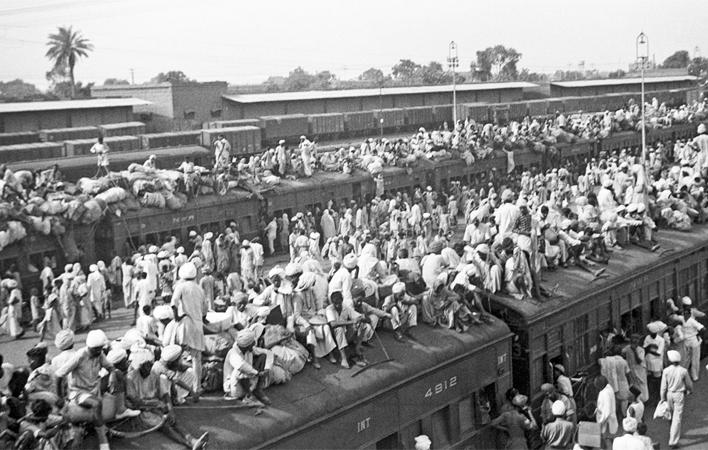
However, as post-Independence India turned 70 this year, this ageing milestone threatens to deprive the coming generations of several first-hand accounts of the struggle for freedom as the generation that lived through those times turns frail with age and begin to leave us.
India’s Independence in 1947 was as sombre as it was jubilant. The chimes of impending freedom brought with them unparalleled savagery as the country was torn asunder into two, leading to the birth of Pakistan. A freshly independent India and newly christened Pakistan, both endured a callous beginning - a beginning dripped in loot and bloodshed of the highest order. By the time both stopped to catch a breath and take stock of their newfound freedom, thousands had been butchered in cold blood across the newly etched borders, during what is often stated as one of the biggest human displacements in modern human history.
Not long after the borders had been fenced and the blood wiped off the divided land, India and Pakistan had turned into two hostile neighbours, destined to be foes for an eternity.
Tales of Partition are often gruesome, laced with plunder and violence of barbaric proportions. They talk about human misery and utter helplessness while being slaughtered by their own kind. They talk about widows, orphans and the dead – all in multitudes. Time, they say is the best healer, yet the agony and the hurt in the eyes and in the voice of those who had endured these horrendous times hasn’t faded over the years. Each time they narrate their stories, their eyes well up as they revisit the horror inflicted upon them through no fault of theirs. Scattered amongst these stories of tragedy and misfortune are accounts of goodness, camaraderie and brotherhood.
Ordinary citizens who risked their life and limb to protect others from rioting mobs during those dark days. Orphans being adopted and raised by families in both India and Pakistan. Heart-warming stories of siblings and families, who were separated during partition only to be re-united years later. The heartbreak of those unlucky ones who live on, having never seen a loved one since they parted ways then, still hopeful of being reunited with them some day. Tales of childhood friendships cut short as they fell on different sides of the newly etched border in 1947.
Countries are political creatures, born out of the desires of men and women who crave kingdoms. India and Pakistan are no different in their origins. The monarchs always tell tales of glory and triumph. It is not until you have heard the testimonies of ordinary men and women subjected to ruthless regimes that you can carve a true depiction of those times. These Partition memoirs of ordinary folk in both India and Pakistan reveal the real impact of the events of 1947. They are timid enough to break down while recounting the horrors of events, yet they are brave enough to rebuke those who were trusted to safeguard citizens, and failed to do so. They are dripped in a perpetual nostalgia of an era that will never return, yet they are ghastly reminders against such bloodshed in future. 70 years on, as the real heroes of these stories grow old and feeble, it is up to the rest of us to hold on to their legacy. It is up to us to safeguard their stories and pass them on to the next generation for whom India’s Independence will be a mere academic milestone.
So, let’s all dig out these tales of partition and use them as a beacon to usher in India’s next generation.
TIA SINGH Young Journalist of the Year
Indian Link’s Tia Singh brings home the honours at the NSW Premier’s Multicultural Media Awards 2017
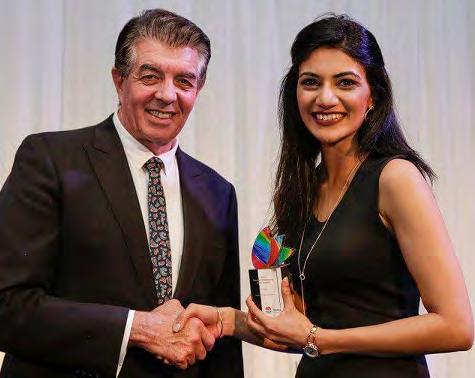
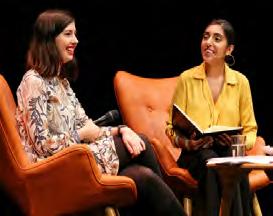
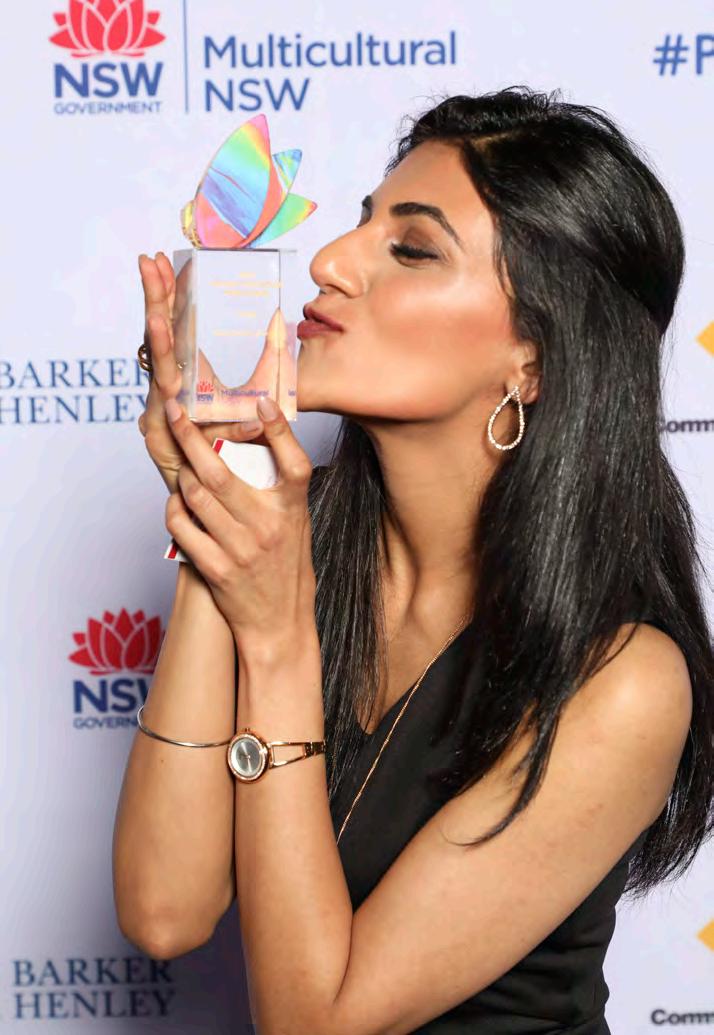
BY
RAJNI
ANAND
LUTHRA enabled it to resonate with so many people. Having been told that there was no space for her and her writing in the Canadian youth
Huge congratulations to Indian Link contributor Tia Singh who took the Young Journalist of the Year honour at the NSW Premier’s Multicultural Media Awards 2017.
Tia received the award from the Minister for Multiculturalism Ray Williams at a ceremony on 30 August.
Tia’s work at Indian Link has straddled many genres: literature, Sikh history, entertainment. Yet, it was her work on gender equality and domestic violence that stood out this past year.
As the community reeled under the shock news of yet another case of horrific domestic abuse - this time in a high-profile Sydney family - Tia vented her frustration in a piece that was widely read and shared. (‘An open letter to my fellow Indian-Australian youth on violence against women,’ Indian Link August-1 pg 39).
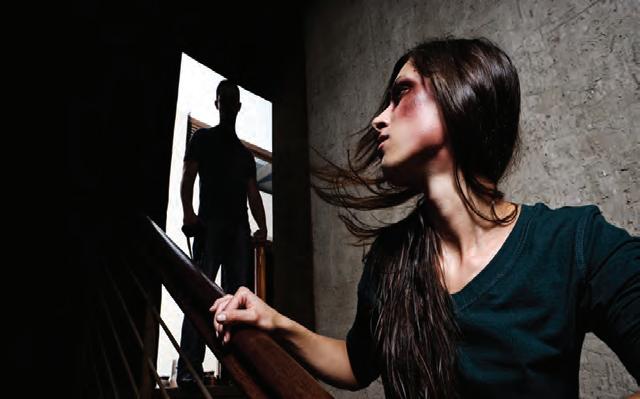
Her work reflects the need for diverse voices to be heard in our media landscape, just as much as it does for community youth to tell their stories - whether they are of dancing the bhangra in gay abandon, or angsting about growing up “different”, or even calling out the idiots amongst us who openly treat women as less than equals.
“My connection with Indian Link has reiterated my flair for writing and voice the issues of my demographic,” Tia observed.
Tia, 24, began her association with Indian Link in 2015. Her first appearance on our pages, though, was way back in 2010, and on our cover, no less. It is an edition that her mum has preserved carefully, even displaying it at the family home’s formal room. (Tia was one of the HSC high achievers we profiled that year.)
It is quite clear that family support has been a huge deal for this up and coming youngster.
“I owe a lot to my mum; her belief in me has been unwavering,” she said. “But I dedicate my award to my grandad, my Nanu, who we lost six months ago. As a lover of the arts - he was a poet and a photographer - he encouraged my creative endeavours ever since I was a child, especially to write.
‘‘ ‘‘
(Tia’s) work reflects the need for diverse voices to be heard in our media landscape, just as much as it does for community youth to tell their stories concerning how the jokes regarding violence against women come so naturally. It has happened with me: sitting in a group of friends, banter flying here and there, when in response to a joke I made, a generally warm-hearted male friend retorted Mein jooti laava?” (“Should I take off my shoe?”) Do we really find jokes that demean one sex to elevate another, funny? We seem convinced that domestic violence cannot and will not happen to us or our peers. We are educated, we are independent, we live NATIONAL EDITION
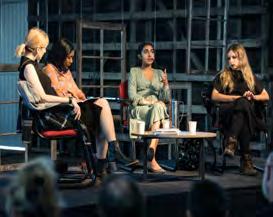
‘My heart aches for sisters…’ so Rupi Kaur writes for their pain BY TIA SINGH I didn’t do it in the traditional way… I didn’t smash the gate, I just created a whole different gate
Kaur was articulate and spoke confidently, warmly and openly answering questions posed by host Sara Mansour, and reading to the audience from her bestselling book. Towards the end of the “In-Conversation” session, Kaur laughingly told her fans that “this is the most I’ve shared in an interview!” An acclaimed poet, 24-year-old Kaur initially appealed to Generation Y as an ‘Insta-poet.’ She took to social media platform Instagram to post her photography and her poetry about issues that she felt passionately about – a step that has now amassed to a 1.3 million strong following. Writing about women’s experience, Kaur taps women like Nikita Chawla, whose husband took a meat cleaver to her head, and Deepshikha Godara, whose intervention order against her estranged husband ran out four days prior to her murder. It starts with one misogynistic joke, one aggressive comment, one remark demeaning women. It is common to joke at the expense of women: we hear it in our songs, we see it in our movies, but just because it is common in our society, it does not make it okay. The Australian government recently launched an anti-domestic violence ad campaign, “Stop it from the Start”. I am all for a bit of banter, but it is On violence against women An open letter to my fellow Indian-Australian youth: When it comes to domestic violence, it should be a deeper conversation than “If he hits me, I’ll just hit him back…” BY TIA SINGH JUNE (1) 2017 15 into what may be considered ‘taboo’ subjects such as menstruation, abuse, and sex, as well as love, loss and survival. our backs tell stories no books have the spine to carry “I wanted to give a voice to women’s experience, not just my own, but my lineage, ‘‘ ‘‘ and women in general,” she said. “I wanted to give a voice to trauma.” She went on, “Writing is deeply cathartic. Studies have shown it has the ability to heal physical wounds, so imagine how powerful it is for mental or emotional trauma.” Kaur said that growing up, she was a “fly on the wall,” and posting to social media was a “way of expressing [herself] almost silently.” She claims she accidentally fell in to writing, after reading the works of poets like Khalil Gibran. “I felt seen for the first time, and this was through other people’s words,” she said. It is apparent that the same sensitivity in her own poetry has Photos: Prudence Upton
Discovering her selves Breaking barriers, one poem at a time In a sold-out session, new age poet Rupi Kaur sat down in front of an audience of over 200 as part of the Sydney Writers’ Festival, to talk about her work and her journey. Kaur is a Canadian- Indian poet, spoken-word artist and visual artist, whose collection of poetry Milk and Honey has sold over 1.4 million copies worldwide. Half expecting to see a room full of young Indian women, it was refreshing and inspiring to see the auditorium brimming with young women - and men - of all cultures, clutching their copies of Milk and Honey. It is a testament to her role in inspiring the younger generation to fall back in love with poetry.
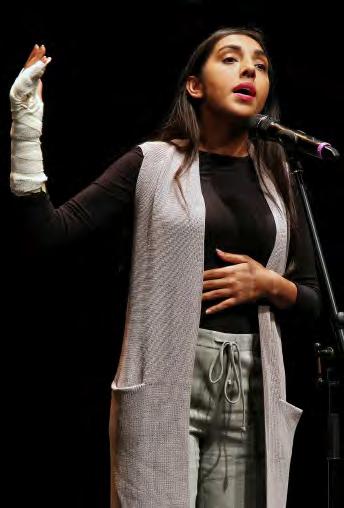
He kept cutouts of every single article of mine. I wish he was here to see me win the award.”
Congratulating her, CEO Pawan Luthra said, “Tia’s knack for finding leads and seeing them through to conclusion is commendable. She has also impressed with her infectious enthusiasm, goodnatured vivacity and ready smile.
I congratulate her on behalf of the Indian Link family and wish her literary sphere, Kaur decided to self- publishing in 2014. “I never paid any mind to those who said I did not fit the mould. I didn’t do it in the traditional way… I didn’t smash the gate, I just created a whole different gate,” she told her smitten fans. Milk and Honey was later rereleased by Andrews McMeel Publishing, and it became New York Times bestseller. Kaur moved to Canada with her family at age 5. Unable to speak English at the time, she began to paint. An ode to her humble beginnings, all the illustrations in Milk and Honey are Kaur’s own. Kaur is currently editing her second book and touring the world, speaking about her journey and meeting fans She credits her success to her dedication to the art, and the unaffectedness in her work. “I wasn’t born a great poet,” she said. “It took discipline and hard work.” all the best.”
At Indian Link, we are proud to be able to provide a platform for emerging talent. This latest award marks our third for young journalists, following Ritam Mitra (2014) and Namita Gohil (2016).






